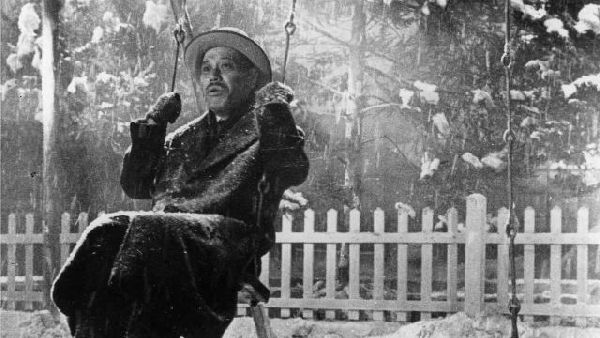Ikiru (1952) 

Director: Akira Kurosawa
Cast: Takashi Shimura, Nobuo Kaneko, Shin’ichi Himori
Synopsis: A bureaucrat tries to find meaning in his life after he discovers he has terminal cancer.
What are you doing? What are you doing that matters, or makes a difference? Chances are: very little. And you know it, but you kid yourself otherwise. Kurosawa knew it, and he created one of cinema’s most powerful movies on the subject. Both emotionally uplifting and bruising, Ikiru tells of one terminally ill man’s endeavour to find a purpose to his life following an existence of inertia.
Kurosawa regular Takashi Shimura plays Kanji Watanabe, a middle-ranking Government bureaucrat who works in a dusty old office, surrounded by towers of ageing documents. Each day he stamps the documents that cross his desk, not to authorise them in any way, but simply to prove that he has, indeed, handled them. He also directs complainants at the Public Liaison office in which he works to other departments. We see this bureaucratic merry-go-round in action when Kurosawa shows us the experience of a group of housewives who want a nearby cesspool paved over and turned into a children’s playground. From Watanabe’s office, the increasingly frustrated women are redirected to a seemingly endless number of departments before finally making it to the office of the Deputy Mayor — who promptly returns them to the Public Liaison office.
Watanabe’s wasted life quickly becomes apparent to him when he receives the diagnosis he has been dreading from his doctor. In a neat reversal, Watanabe is actually dreading receiving the news that he only has an ulcer after hearing from a fellow patient in the waiting room about how doctors always say that when a patient has terminal stomach cancer. And we already know that that is what he has because the opening shot of the movie is of an X-ray of Watanabe’s cancerous stomach. The doctor repeats the patient’s words almost line-by-line, confirming Watanabe’s fears and sending him on a desperate attempt to inject some meaning into his life.
Watanabe’s despairing quest takes him to the city’s sleazier dens as he briefly pursues a life of hedonistic excess. He’s accompanied through this modern underworld by a writer of cheap novels (Yunosuke Ito), a dark guide complete with black dog. ‘How tragic.’ this Mephistopheles-like figure opines before taking Watanabe on a tour of Tokyo’s pachinko parlours, drinking joints, dance halls and brothels, ‘that man can never realise how beautiful life is until he is face to face with death.’ This whirlwind introduction to decadence fails to fulfil Watanebe, however, and in one of the film’s key scenes, he sadly sings a haunting song from his youth that provides a brief, hushed interlude to the revelry around him.
The next day, Watanabe is spotted by Toyo (Miki Odagiri), a young female member of his staff. Because he hasn’t attended work since learning of his illness, she has tracked him down because she’s needs his official stamp so that she can move to another job. They spend the day together, something which will later lead his materialistically selfish son and daughter-in-law to believe he is spending all his savings on a much younger woman. Watanabe senses in Toyo the youthful spark of life that he lost so long before, and he seems to hope that he can somehow draw on that natural exuberance of youth. But once lost, youth can never be reclaimed, something which becomes evident as his and Toyo’s relationship quickly grows strained because their age difference leaves them with nothing in common. However, it is Toyo who inadvertently gives Watanebe the idea that will fill his last remaining weeks with a sense of purpose as he resolves to ensure that the playground the women wanted will be built.
It’s a modest ambition, but it’s a noble one, and one that will make a difference to a number of lives. It’s typical of Kurosawa that instead of presenting us with a straightforward depiction of Watanabe going about his mission, we are instead whisked straight to his wake. Ikiru isn’t just a film which forces us to ask questions about our own lives and how they are led, but also examines the ways in which other people’s interpretations of the noblest of acts can be tainted by social forces, and the sometimes prejudiced — and frequently just plain blind – attitudes of those mired in meaningless lives.
At Watanabe’s wake, the dead man’s former colleagues grow increasingly inebriated as they quarrel over the part he played in securing the completion of the playground, and his contribution is quickly swallowed up by claims and counter-claims of ownership. However, as each colleague recalls a different aspect of Watanabe’s pursuit of his dream. It eventually becomes apparent to all that he was the prime architect of its construction.
But does it really matter that credit is correctly apportioned? I don’t think it does to Watanabe. The last shot we see of him is in the newly-built playground at night. In a gentle snowfall he works one of the swings as he hums the melancholic song we heard earlier. But we’re left in no doubt that he is now a happy, fulfilled man who is able to die in the knowledge that he has left something of worth behind. It’s a sublime and humbling shot that is heart-breaking in its simplicity.
(Reviewed 25th February 2013)
httpv://www.youtube.com/watch?v=_mLrLHDdXHI
